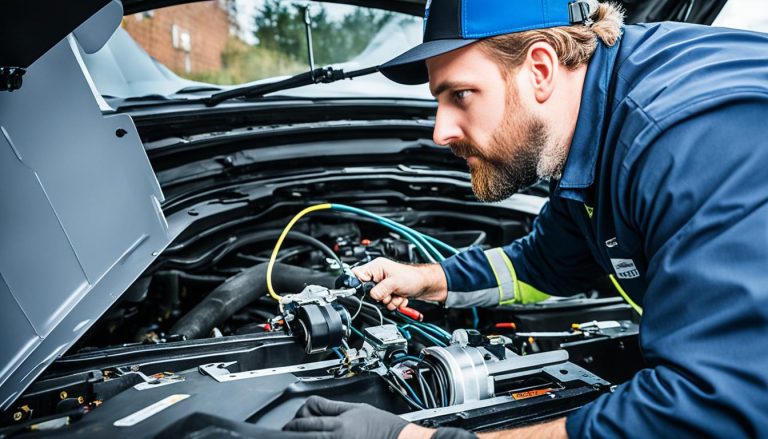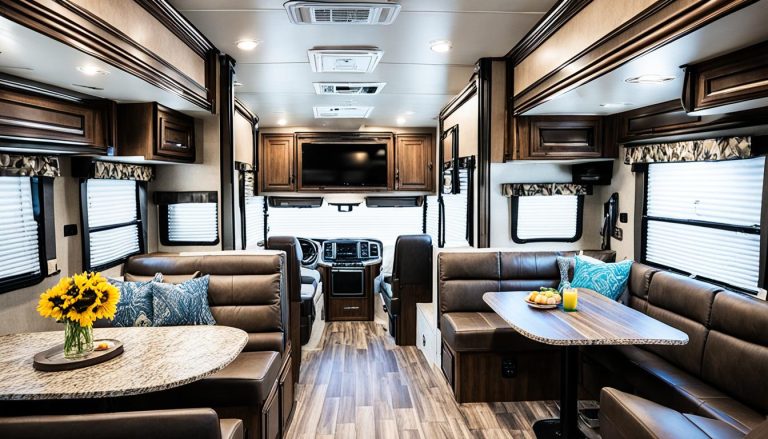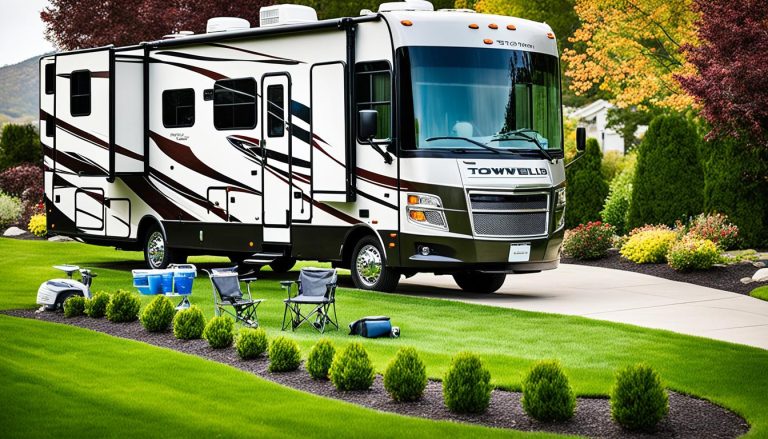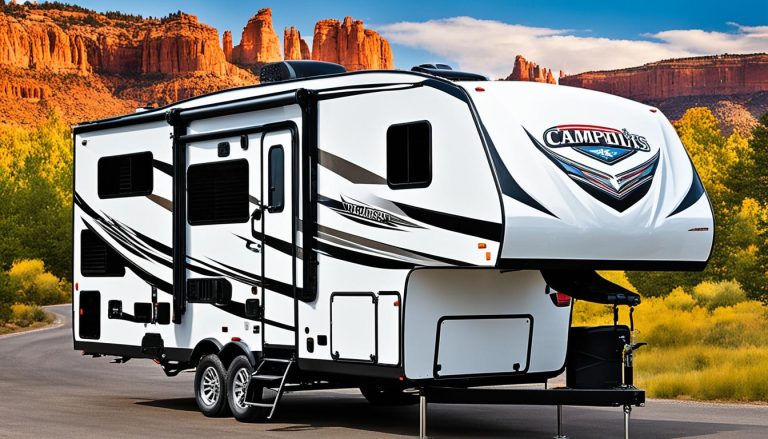Towable RV Financing: Loans & Seller Options
gorvlifestyle.com and its partners may earn a commission if you purchase a product through one of our links
For many Americans, the dream of exploring the open road and immersing themselves in the beauty of the outdoors is made possible with a towable recreational vehicle (RV). However, the substantial investment required to own one of these mobile havens necessitates an understanding of the available Financing Options for buying a Towable RVs. They represent a considerable purchase, varying extensively in cost based on model, amenities, and condition. Many seek financial assistance through towable RV loan companies, which specialize in crafting loan agreements that function similarly to auto loans but with unique aspects tailored to RV ownership. To navigate this process successfully, one must become familiar with the nuances of the RV loan approval process—a systematic approach involving comprehensive applications, potential inspections, and usually, a requisite down payment.
The diverse landscape of RV financing hosts a range of lender types, including well-known banks, credit unions, dedicated online lenders, and of course, the RV dealerships themselves. Each offers different terms, rates, and loan durations, ensuring there’s an option that fits nearly every prospective traveler’s financial situation. As they prepare to venture into the realm of RV ownership, buyers must weigh their financing choices, compare lender offerings and step assuredly through the approval sequence to secure their mobile piece of paradise.
Key Takeaways
- Understanding different financing options for buying a Towable RVs is crucial for prospective buyers.
- A spectrum of towable RV loan companies is available, including banks, credit unions, online lenders, and RV dealerships.
- The RV loan approval process resembles that of auto loans but includes additional considerations like RV inspections.
- Securing financing may require a down payment, with terms and conditions varying by lender.
- Research and comparison of loan rates, lengths, and terms are essential steps before finalizing any RV financing arrangement.
Understanding Towable RV Financing and How It Works
When it comes to financing the adventure of a lifetime in a towable RV, prospective buyers are often met with a variety of loan options. Understanding the nuances between secured and unsecured RV loans is crucial in making an informed decision that aligns with one’s financial landscape. This process not only influences how buyers finance their RV but also affects long-term financial commitments.
Secured vs. Unsecured RV Loans: Knowing the Difference
Secured RV loans are tethered to the RV itself, which serves as collateral. This relationship between lender and borrower brings lower interest rates, making these loans especially advantageous for individuals with subprime credit scores. On the flip side, unsecured RV loans are based solely on creditworthiness and do not hold the RV as collateral, thus posing no risk of repossession but usually come with higher interest rates.
The Role of Collateral in RV Financing
In the realm of RV financing, the significance of collateral cannot be overstated. For secured RV loans, the RV’s value directly influences the loan’s terms. While providing a safety net for lenders, it adds a layer of responsibility for borrowers — the risk of losing their mobile abode in the event of a defaulted loan. Contrastingly, unsecured RV loans free the asset from potential seizure but reflect the increased risk in the cost of borrowing.
Repayment Terms Range: From Short-Term to Extended Options
Repayment terms for an RV loan can stretch over different time frames, offering flexibility — from short-term commitments to elongated periods extending up to 20 years. While longer terms can reduce the monthly financial impact, they also result in greater total interest over the life of the loan.
| Loan Type | Interest Rates | Risk of Repossession | Credit Influence | Typical Repayment Term |
|---|---|---|---|---|
| Secured RV Loan | Generally Lower | High | Less Impactful | 5-20 Years |
| Unsecured RV Loan | Higher | None | Highly Impactful | 1-7 Years |
Whether choosing secured or unsecured RV loans, borrowers must weigh the immediate and long-term financial implications, ensuring that they select an option that complements their fiscal strategy and empowers them to hit the open road with confidence.
Financing Options for buying a Towable RVs (loans, dealerships, private sellers)
Embarking on the RV lifestyle by financing a travel trailer opens up a world of adventure and requires careful consideration of the available financing avenues. People who are looking to acquire a towable RV will find a diverse range of options, from the more traditional lending institutions, such as banks and credit unions, to flexible dealership financing plans, as well as personalized agreements from RV private sellers. Each option presents its own series of benefits, challenges, and requirements that are crucial for potential buyers to assess.
Financing through banks and credit unions often involves secured loans, using the RV as collateral. This can result in more favorable interest rates but also entails a risk of losing the vehicle in situations of payment default. In contrast, an unsecured loan provides an option without the use of the RV as collateral, though it usually comes with a higher interest rate, depending on one’s creditworthiness.
RV dealerships are convenient for buyers looking to pair the shopping and financing experience under one roof. While they can offer competitive rates through established partnerships with financial institutions, it’s vital for customers to be aware of any additional fees or premiums included in dealership financing.
Purchasing from RV private sellers may afford a more negotiable pricing structure and potential cost savings. However, buyers must due diligence to ensure transparent and secure transactions, often without the backing of dealership warranties or return policies.
Prospective travelers should thoroughly evaluate their financing options, considering the long-term implications on their finances and their readiness for RV ownership. Below is a comparative summary to help discern the best path to financing a travel trailer.
| Financing Source | Loan Type | Pros | Cons |
|---|---|---|---|
| Banks/Credit Unions | Secured/Unsecured | Potentially lower rates with secured loans | Possible loss of RV with secured loans if defaulted |
| RV Dealerships | Secured, often with dealership incentives | Convenience of one-stop shopping and financing | May include additional costs or higher rates |
| Private Sellers | Varies, negotiable | Potential for better deals and negotiation | Requires comprehensive due diligence and lack of warranty |
Investigate each financing route to determine the best fit for your travel and financial goals, and remember that preparation and education are the keys to a smooth and rewarding purchase process.
With thoughtful contemplation and a strategic approach, the journey towards owning a towable RV can be as exciting as the open road that lies ahead for the adventurous spirit.
Preparing for the Towable RV Loan Approval Process
Embarking on the journey toward owning a towable RV begins with understanding the RV loan approval process. Acquiring favorable RV loan rates and satisfying RV loan requirements requires advance preparation and informed decision-making. Prospective buyers must diligently navigate through several critical steps to position themselves as ideal loan candidates. Let’s dive into the essential practices that can enhance your loan approval chances and financial terms.
Checking Your Credit Score: The First Step to Loan Approval
One of the first and most crucial steps in seeking RV financing is to check your credit score. Lenders will scrutinize your credit history to determine your trustworthiness as a borrower, and a higher score could lead to more attractive loan terms. Be proactive in obtaining your credit report from major bureaus to ensure accuracy and resolve any discrepancies before lenders view it.
Calculating Your Budget: Tools and Tips
Understanding your financial standing is key when considering a major purchase like a towable RV. Utilizing online RV loan calculators can help you estimate monthly payments and gauge what you can afford. Include not only the cost of the RV but also other ownership expenses in your calculations to avoid any budgetary surprises down the line.
The Importance of a Down Payment and How It Affects Your Loan
Accumulating funds for a down payment is an important part of the pre-approval process. A significant down payment not only decreases your borrowed amount but can also positively affect your loan interest rates and terms. Lenders see a substantial down payment as a display of financial responsibility, which may lead to more favorable RV loan rates.
The Search for Competitive RV Loan Rates
Finding an affordable RV loan is paramount for enthusiasts looking to hit the road without financial strain. Diverse lending options contribute to a marketplace where RV loan rates can vary significantly. For those seeking to buy towable RVs, the loan’s Annual Percentage Rate (APR) will play a crucial role in determining overall cost. It’s essential that shoppers explore various towable RV loan companies and compare rates to find the best fit for their RV financing needs.
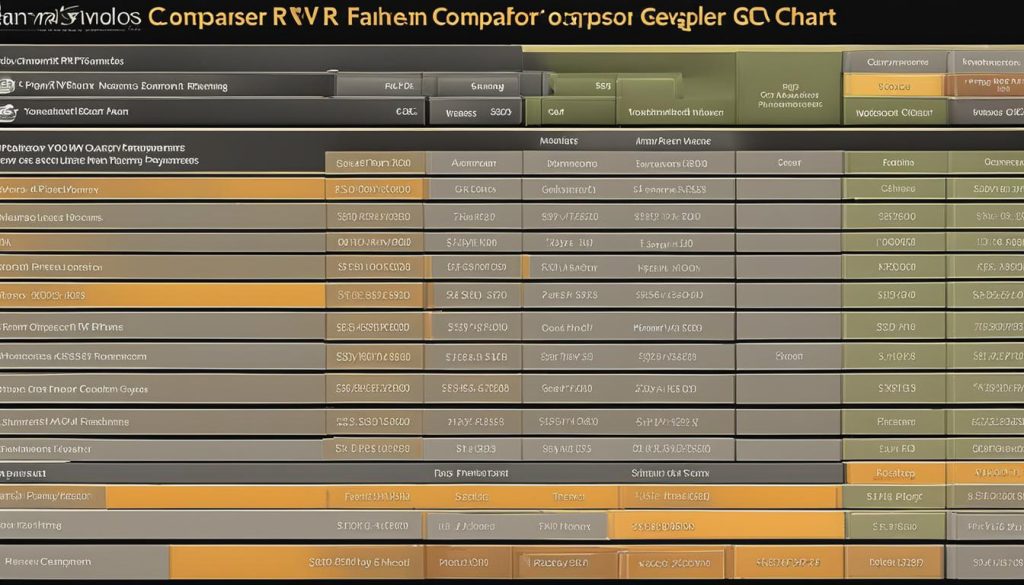
Securing the Best APR for Your Financial Situation
Aspiring RV owners should be mindful that the best APRs typically align with a strong credit profile. However, market competition means there are opportunities to secure favorable rates even for those with less-than-perfect credit. Different lenders cater to different borrower profiles, offering a spectrum of rates based on creditworthiness, income, and other financial factors.
Comparing Rates from Online Lenders, Banks, and Credit Unions
Beyond brick-and-mortar financial institutions, online lenders have emerged as a convenient source for potential borrowers to obtain competitive RV loan rates. Banks and credit unions offer the familiarity of local service, which can be advantageous for those who appreciate face-to-face interaction and personalized service.
| Lender Type | Typical APR Range | Benefits |
|---|---|---|
| Online Lenders | 4.5% – 7.0% | Convenient application process, prequalification options |
| Banks | 3.99% – 6.5% | Competitive rates for customers with strong credit history |
| Credit Unions | 3.75% – 6.25% | Lower rates for members, personalized customer service |
In-depth research and careful comparison of these sources can save borrowers thousands over the life of a loan. By understanding one’s financial position and the range of rates available, financing an RV becomes a calculated decision leading to more manageable repayments and overall satisfaction with the investment.
Exploring Dealer Financing for Towable RVs
When embarking on the journey to purchase a new towable RV, many adventurers find that RV dealerships offer a seamless blend of selection and finance options right on the premises. However, it is crucial to navigate these waters with caution, ensuring that you secure a deal that is as financially sound as it is convenient. As the nexus between RV selection and financing, dealerships provide a service that can be both a boon and a bane for unwary consumers.
Convenience vs. Cost: Navigating Dealership Loans
RV dealerships excel in presenting customers with an immediate financing a travel trailer; the allure of wrapping up sales and loans in one location can be incredibly strong. However, this convenience may sometimes come at a cost. The savvy buyer should consider the long-term financial implications of their dealership loan, understanding that the ease of a one-stop-shop scenario might overshadow potentially higher APRs and less flexible loan terms.
The Relationship Between Dealerships and Financing Institutions
Ringing true in the world of RV loans, dealerships often maintain established partnerships with various financing institutions. These relationships allow them to offer on-the-spot RV loans, often tailored to meet the varying needs of a diverse clientele. However, the intertwined interests of dealerships and lenders mean that it’s imperative for buyers to do their due diligence by comparing the dealership’s offer to other market options.
| Financing Source | APR Range | Loan Term Options | Down Payment Requirements | Credit Approval Time |
|---|---|---|---|---|
| RV Dealership | 4% – 17% | 5 – 20 years | 0% – 20% | Instant to Several Hours |
| Bank/Credit Union | 3% – 15% | 3 – 15 years | 10% – 20% | 1 – 3 Days |
| Online Lender | 2.5% – 16% | 1 – 10 years | Varies | Instant to 24 Hours |
Ultimately, the journey to finance an RV involves weighing the immediate benefits against potential long-term costs. Informed decisions require thorough research and a willingness to explore beyond the convenience offered by RV dealerships. By embracing a proactive approach and scrutinizing the details within each possible RV loan, a buyer can not only acquire their dream travel trailer but do so under terms that dovetail seamlessly with their financial landscape.
Alternatives to Traditional RV Loans
Exploring options beyond conventional RV financing can unearth alternative pathways like personal loans and leveraging home equity. These alternatives come with their unique sets of advantages and potential risks that are vital to consider for any savvy buyer desiring a smooth journey to RV ownership.
Financing Through Personal Loans: Pros and Cons
Personal loans for RV purchase shine as a flexible financing method that does not typically require collateral. One’s credit score and financial history play significant roles in loan approval, which contrasts the secured nature of an RV loan. The convenience of a personal loan must be weighed against the possibility of higher interest rates that accompany this unsecured loan option.
Leveraging Home Equity for RV Purchases
Home equity loans for RVs tap into a homeowner’s accumulated property equity, offering potential access to larger sums of money, which may come with lower interest rates. However, borrowing against one’s home does have its cautionary aspects, chief among them the sobering reality that defaulting could mean foreclosure.
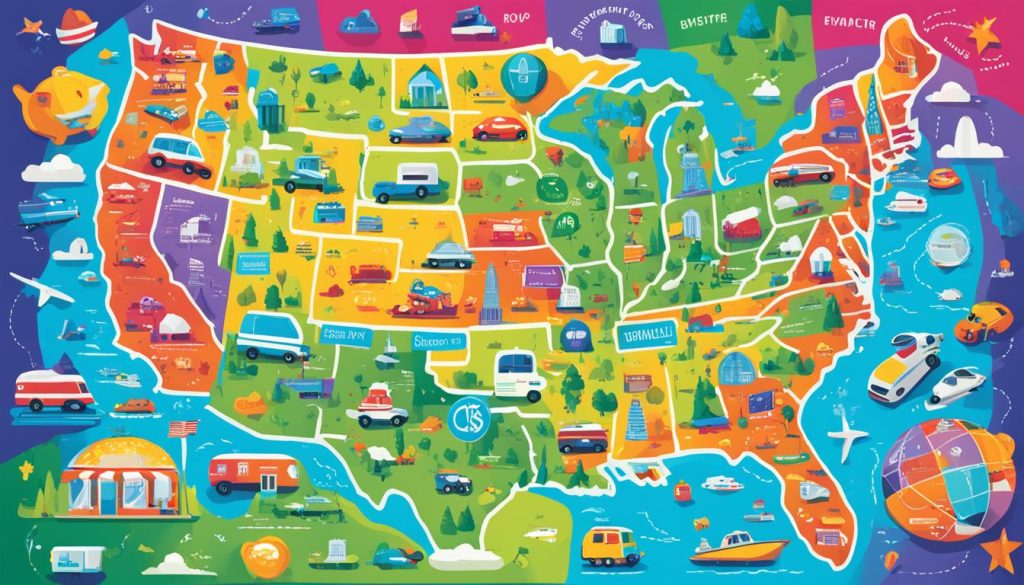
When considering how to fund your towable RV dreams, an informed approach to these financing alternatives can mean the difference between a stress-free purchase and one fraught with financial pitfalls. Detailed assessment of both, personal loans and home equity loans, can lead to a tailored solution that fits one’s personal financial landscape.
| Financing Type | Pros | Cons |
|---|---|---|
| Personal Loans |
|
|
| Home Equity Loans |
|
|
How to Choose the Right Towable RV Loan Company
Embarking on the journey to secure a towable RV loan can be as exciting as planning the road trips themselves. However, the key to a smooth ride in the financial landscape is choosing a loan company that not only meets your RV loan requirements but also offers a seamless RV loan approval process. An informed decision can set the stage for years of enjoyable RV experiences without the burden of unsuitable loan terms.
Assessing Lender Reputation and Customer Service
When it comes to towable RV loan companies, reputation is paramount. Researching previous customer experiences, checking for ratings from financial bureaus, and understanding the level of customer support provided are steps that can help prevent roadblocks down the line. A company’s responsiveness to inquiries and problems is indicative of their overall service quality—a critical consideration when you’re in it for the long haul.
Comparing Loan Terms and Fine Print
Before signing on the dotted line, a careful examination of loan terms can save future headaches. Potential fees, payment penalties, and the overall flexibility of the loan structure should be thoroughly compared. A side-by-side analysis is essential to discern which loan company offers the optimal package for your travel trailer aspirations.
| Loan Company | Interest Rate (APR) | Loan Term (Years) | Down Payment Required | Penalties for Early Payment |
|---|---|---|---|---|
| Company A | 5.5% | 10 | 20% | No |
| Company B | 6.0% | 15 | 10% | Yes |
| Company C | 4.9% | 20 | 15% | No |
RV Loan Requirements and How to Meet Them
Navigating the path to securing an RV can be an exciting yet meticulous process. Understanding the RV loan requirements is essential to ensure a smooth transition from dreaming about a travel trailer to financing and owning one. The RV loan approval process is multi-faceted, requiring potential borrowers to present a strong financial profile along with the necessary documentation to satisfy lenders.
Gathering Necessary Documentation for a Smooth Application
Consolidating the paperwork upfront can significantly expedite your loan application when financing a travel trailer. Lenders typically need to validate your identity, financial stability, and creditworthiness to process your request. Anticipate the need to provide government-issued identification, proof of income such as pay stubs or tax returns, and proof of residence. If applicable, your lender might also request a detailed history of your employment and information about the RV, including the purchase agreement or bill of sale, title, and registration documents.
Understanding the Criteria Used by Lenders
Lenders evaluate RV loan applications with attention to a few key aspects: your credit history, debt-to-income (DTI) ratio, and the asset’s value. A high credit score may secure you more attractive loan terms and potentially lower interest rates, suggesting to lenders that you’re a responsible borrower. Your DTI ratio helps lenders understand how your current debt relates to your income, indicating your capacity to fulfill new debt obligations. Additionally, the RV itself is assessed to ensure it holds adequate value as collateral for secured loans.
Pro Tip: Before applying, review your credit report for errors and pay down existing debts as much as possible to improve your DTI ratio. This can place you in a stronger position for loan approval and favorable terms.
| Documentation | Details Required | Significance |
|---|---|---|
| Personal Identification | Driver’s license, passport, or state-issued ID | Confirms your identity and prevents fraud. |
| Proof of Income | Recent pay stubs, W-2s, or tax returns | Demonstrates your financial ability to repay the loan. |
| Proof of Residence | Utility bills, lease agreement, or mortgage statement | Confirms your stability and residency for lenders. |
| Employment History | Contact information of current and past employers | Illustrates employment stability and reliability. |
| RV Details | Title, registration, purchase agreement | Ensures the RV meets collateral requirements and has a clear title. |
Meeting all RV loan requirements in advance will not only prepare you for a successful application but it also sets a foundation for managing your investment in the exciting world of RV travel.
Tips for Working with RV Private Sellers
For many, the journey towards owning a towable RV begins with the search for the perfect model and ends with the thrill of hitting the open road. Along the way, purchasing from RV private sellers can be a strategic move that brings with it a set of unique advantages and considerations. To help prospective buyers navigate this pathway, we’ve compiled a series of tips to ensure a seamless transaction and satisfaction on both sides of the deal.
Navigating Private Seller Agreements
When embarking on the purchase of a towable RV through a private seller, it’s vital to walk through the process with a clear understanding of the necessary agreements. A comprehensive examination of the RV is non-negotiable; this includes inspecting its condition, verifying service histories, and ensuring all operational components are in working order. Securing a clear title is paramount to avoid any future legal complications, and in some cases, an independent inspection can provide peace of mind, affirming the RV’s state and value.
Here are some critical points to consider when crafting and finalizing agreements with private sellers:
- Price Negotiations: Private sales often leave room for price flexibility, potentially allowing for a more favorable deal that fits your budget.
- Contract Specifics: Ensure all terms, conditions, and promises are well-documented to protect both parties.
- Payment Terms: Discuss and agree on a secure, mutually beneficial payment method that aligns with both party’s expectations.
The Advantages of Buying from a Private Seller
Why consider buying from a private seller over a dealership or traditional loan avenue? The reasons vary but often include:
- Potential for a lower purchase price, away from the overheads of a dealership.
- Less pressure to make quick decisions, allowing for thorough due diligence.
- Direct insights from the previous owner about the RV’s quirks and qualities.
To complement these advantages, prospective buyers should explore financing options for buying Towable RVs, understanding that while private sellers may not offer the same financing plans as dealers, buyers can still secure loans through banks, credit unions, or online lenders tailored to their specific financial situation and RV ownership goals.
Exercising diligence, confirming details, and considering all available financing routes will help make your purchase from an RV private seller a successful first step toward countless adventures on the open roads.
Finalizing Your RV Purchase: Steps After Loan Approval
Upon securing the RV loan approval process, the focus shifts toward a crucial phase that ensures the integrity and value of your new investment: the RV inspection and appraisal. This post-approval period is pivotal, involving detailed assessments that safeguard both the buyer’s and lender’s interests. Understanding what this entails can prepare you for a smooth transition to RV ownership.
Completing the RV Inspection and Appraisal Process
An exhaustive RV inspection is imperative before taking to the open road. Typically, this begins with a Level 1 inspection, which serves as a general overview, examining the RV’s exterior and interior for any obvious issues. More in-depth scrutiny comes into play with a Level 2 inspection, which delves into the mechanics, especially for motorized RVs. Here, a technician will look into engine performance, fluid conditions, and other critical components that could affect the vehicle’s reliability and safety.
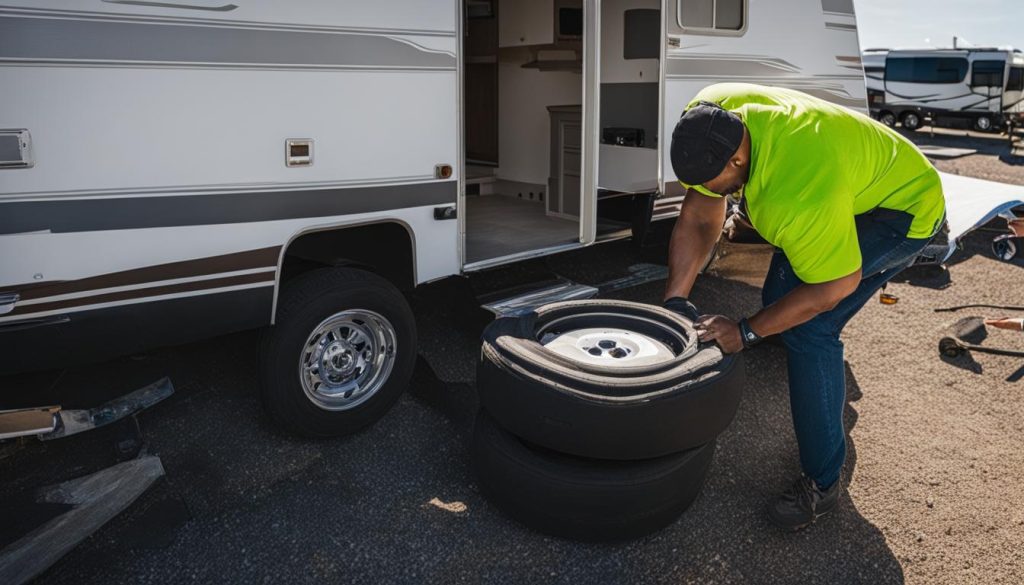
Simultaneously, an appraisal may be necessitated, especially when the loan requires confirmation of the RV’s worth. This independent appraisal is designed to ensure that the financed amount aligns with the actual market value of the RV, thereby protecting the lender’s asset and confirming the buyer’s investment choice.
What to Expect When Closing on Your RV Loan
The closing process is the final leap towards ownership. It typically involves meticulous documentation, with signatures required on several loan documents that detail your payment obligations and the terms of your loan agreement. Also, coordination with the RV dealership or seller, the lender, and potentially a third-party vendor, is essential to handle the title transfer and registration—a process that varies significantly across different states.
Each step in finalizing your RV purchase, from the RV loan approval process to the detailed RV inspection and appraisal, paves the way for a confident entry into RV ownership. A thorough walk-through of these steps can significantly reduce the risks and uncertainties associated with such a significant investment.
Ready to Embark on Your Towable RV Adventure?
Embarking on a journey in a towable RV symbolizes freedom, adventure, and the excitement of exploring the open road. You’ve meticulously reviewed your financing options, weighed the varying terms of RV loans, and considered both RV dealerships and RV private sellers as possible avenues to secure your mobile haven. With a solid plan for financing a travel trailer and a clear understanding of what it takes to gain loan approval, you are now well-prepared to take that final step towards RV ownership.
Whether you opt for the security of a secured loan or the flexibility of an unsecured option, the wide array of choices available allows for a financing solution that matches your financial situation and travel aspirations. The path ahead is not simply about signing documents; it’s about making informed choices that resonate with your personal goals and lifestyle. Securing the keys to your towable RV is just the beginning of what promises to be an enriching experience of discovery and memorable escapades.
With every box checked—from selecting the optimal loan provider to ensuring a thorough inspection of your potential new home-on-wheels—the adventure you have dreamed of is now within grasp. The experiences that lie ahead on the endless routes crisscrossing the picturesque landscapes of America await. As the final preparations are made, and the excitement builds, you stand on the cusp of turning the key to not just an RV, but to a life enriched with the joys of travel and the allure of the road less traveled.

